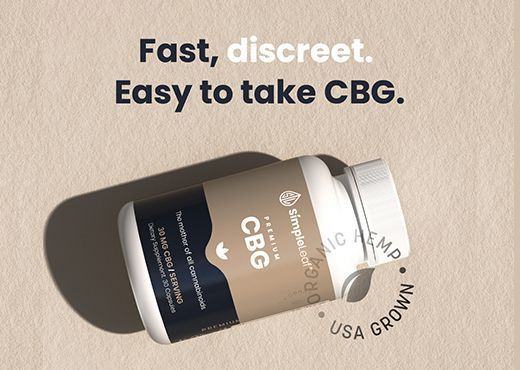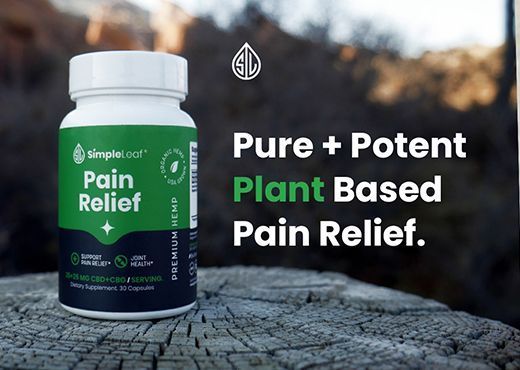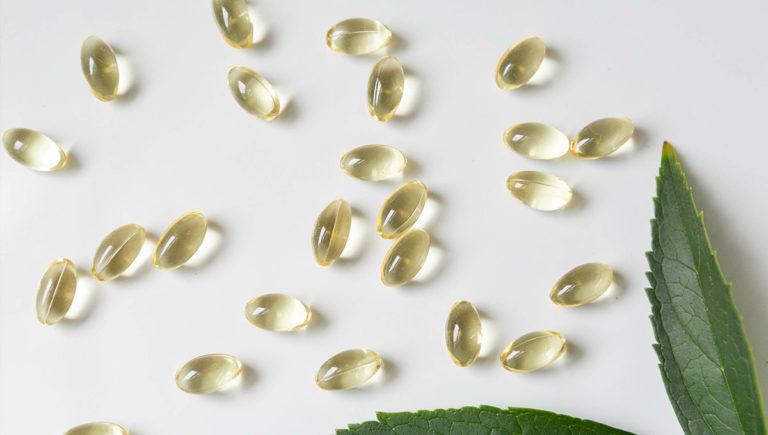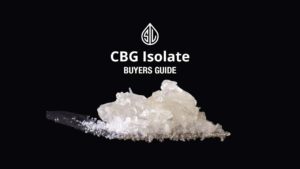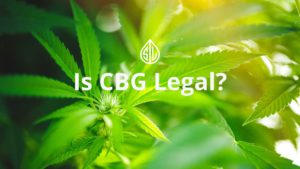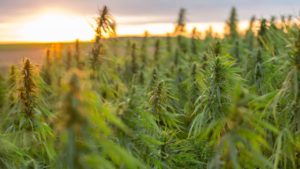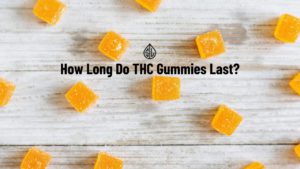
CBG vs CBD: Unraveling the Mystery of Cannabinoids

Sara S.
Simple Leaf Staff
CBG vs CBD
Today, we’re going to dive into the world of cannabinoids, specifically focusing on two increasingly popular ones: CBG (Cannabigerol) and CBD (Cannabidiol). Both have been making waves in the wellness industry, but what exactly are they, and how do they differ? Let’s find out!
What are CBG and CBD?
CBG and CBD are both non-psychoactive cannabinoids found in the cannabis plant. This means they won’t get you “high” like THC (tetrahydrocannabinol), the most well-known (and infamous) cannabinoid.
CBG (Cannabigerol)
CBG is often referred to as the “mother of all cannabinoids” because other cannabinoids, including CBD and THC, are derived from its acidic form. However, because most of the CBG is converted into other cannabinoids as the plant matures, it’s usually present in low concentrations (usually less than 1%) in most cannabis strains.
CBD (Cannabidiol)
CBD, on the other hand, is the second most abundant cannabinoid in cannabis, right after THC. It has gained massive popularity in recent years due to its potential therapeutic benefits and the fact that it doesn’t produce the “high” associated with THC.
CBG vs CBD: The Differences
While CBG and CBD share some similarities, they also have distinct characteristics that set them apart.
Here are some key differences:
- Origins: CBG is often referred to as the “mother of all cannabinoids” because it is the precursor from which other cannabinoids are synthesized, including CBD and THC. In contrast, CBD is a direct derivative of the cannabis plant.
- Concentration in the plant: CBD is typically found in higher concentrations in most cannabis strains, while CBG is usually present in lower amounts (less than 1%).
- Medical benefits: Both CBG and CBD have potential therapeutic benefits, but they are used for different purposes. CBD is well-known for its potential in relieving pain, reducing anxiety and depression, and alleviating cancer-related symptoms. CBG, on the other hand, is being studied for its potential in treating glaucoma, bladder dysfunctions, and bacterial infections.
- Interaction with the endocannabinoid system: CBD has a low affinity for the cannabinoid receptors in the body but can interact with other non-cannabinoid receptors. CBG, on the other hand, directly interacts with the CB1 and CB2 cannabinoid receptors in the brain.
- Legal status: Is CBG legal? Both CBD and CBG are legal in many parts of the world, including the United States, as long as they are derived from hemp (cannabis plants with less than 0.3% THC). However, laws can vary greatly by country and even within regions of the same country, so it’s important to check local laws.
Remember, while both CBG and CBD have shown promise in research, more studies are needed to fully understand their effects and potential benefits. Always consult with a healthcare provider before starting any new supplement regimen.
Effects on the Body
Both CBG and CBD interact with the body’s endocannabinoid system (ECS), a complex cell-signaling system that plays a role in regulating a range of functions and processes, including sleep, mood, appetite, and memory. However, they interact with the ECS in slightly different ways.
CBG is thought to interact directly with the CB1 and CB2 cannabinoid receptors in the brain. CBD, on the other hand, doesn’t bind directly to these receptors. Instead, it seems to work by preventing endocannabinoids (naturally occurring cannabinoids in the body) from being broken down, enhancing their effects.
Does CBG get you stoned?
No, CBG (Cannabigerol) does not get you “stoned” or produce a high. CBG is a non-psychoactive cannabinoid, which means it doesn’t have the mind-altering effects associated with THC (Tetrahydrocannabinol), the main psychoactive component in cannabis.
While CBG interacts with the same cannabinoid receptors in the brain that THC does, it does not produce the psychoactive effects that THC does. Instead, CBG is being researched for its potential therapeutic benefits, such as its anti-inflammatory, antibacterial, and neuroprotective properties.
However, it’s important to note that cannabis products can contain varying levels of different cannabinoids, including both CBG and THC. So while CBG itself won’t get you high, if you’re using a product that also contains THC, you could experience psychoactive effects. Always check the cannabinoid content of the products when you buy cbg online.
Potential Health Benefits
Both CBG and CBD have been studied for their potential health benefits, although research is still in the early stages.
CBD has been researched more extensively than CBG, and studies suggest it may have potential benefits for conditions like epilepsy, anxiety, chronic pain, and insomnia. It’s also the active ingredient in Epidiolex, the first FDA-approved cannabis-derived medicine, used to treat rare forms of epilepsy.
CBG, while less studied, has shown promise in preliminary studies for its potential anti-inflammatory, antibacterial, and neuroprotective effects. Some research suggests it may also help treat conditions like glaucoma and bladder dysfunctions, but more studies are needed to confirm these findings.
Where To Buy CBD CBG products?
Many companies sell CBG products online. These can range from specialized cannabis and hemp product retailers to more general health and wellness websites. Always make sure to buy from reputable sources that provide third-party lab test results to ensure product quality and safety.
Before purchasing CBG, it’s important to research the product and the company to ensure you’re getting a high-quality and safe product. Look for products that have been tested by a third-party lab to verify their cannabinoid content and check for contaminants.
Simple Leaf’s Premium Organic CBG is easily the best organic CBG you can buy on the internet.
Give it a try and if you don’t like it, there is a no questions asked 44-day return policy.
Additional CBD CBG products to check out...
Simple Leaf’s Premium Organic CBD:CBG features 25mg of both CBD and also 25mg of CBG blended with Turmeric Curcumin and Acai Berries. It is easily our best-selling CBG CBD Product.
If you’re looking for CBD CBG gummies, Simple Leaf has some of the best organic hemp gummies available for sale as well.
Recap / Conclusion
In conclusion, while CBG and CBD are both non-psychoactive cannabinoids with potential health benefits, they differ in their concentration in the cannabis plant, how they interact with the body’s endocannabinoid system, and the extent to which they have been studied. As research continues, we can expect to learn more about these fascinating compounds and their potential therapeutic uses.
CBD and CBG are compounds found in a plant called cannabis, which you might know as marijuana or hemp. These compounds are part of a larger group of substances called cannabinoids. The cannabis plant has over 100 different cannabinoids, but CBD (Cannabidiol) and CBG (Cannabigerol) are two of the most researched ones. CBD and CBG do not cause a “high”. They are non-psychoactive, which means they don’t alter your mind or make you feel intoxicated.
- CBD (Cannabidiol): This is the most well-known cannabinoid after THC. It’s been widely studied and is often used for its potential health benefits. Some people use CBD products to help with issues like pain, anxiety, and sleep problems. It’s available in many forms, including oils, edibles, and creams.
- CBG (Cannabigerol): This is less well-known and typically found in lower amounts in the cannabis plant. However, it’s gaining attention for its potential health benefits. Some research suggests that CBG might help with conditions like glaucoma (an eye condition) and bladder dysfunctions. It’s often referred to as the “mother of all cannabinoids” because other cannabinoids, including CBD and THC, are derived from it.
It’s important to note that while CBD and CBG have shown promise in research, more studies are needed to fully understand their effects and potential benefits. Also, laws about products made from cannabis plants can vary a lot depending on where you live, so it’s always a good idea to check local regulations.
Disclaimer: While CBG and CBD are generally considered safe, they can interact with certain medications. Always consult with a healthcare provider before starting any new supplement regimen, especially if you have any pre-existing conditions or are taking other medications as they can help you understand the potential benefits and risks.
Sources:
- Russo, E. B. (2011). Taming THC: potential cannabis synergy and phytocannabinoid-terpenoid entourage effects. British journal of pharmacology, 163(7), 1344-1364. Link
- “What is CBG (Cannabigerol)?” Leafly. Link
- “What is CBD (Cannabidiol)?” WebMD. Link
- “Cannabidiol (CBD) — what we know and what we don’t.” Harvard Health Blog. Link
- “CBG vs CBD: What Are the Differences?” Healthline. Link
Please note that while these sources provide information that supports the potential benefits of cannabinoids, more research is needed to fully understand their effects and potential therapeutic uses. Always consult with a healthcare provider before starting any new health regimen.
Meta Keywords: cbg vs. cbd, Does CBG get you stoned, Is CBG legal, Where to buy CBG, CBD CBG gummies, Difference between CBD and CBG, CBD and CBG combined products, CBG benefits

